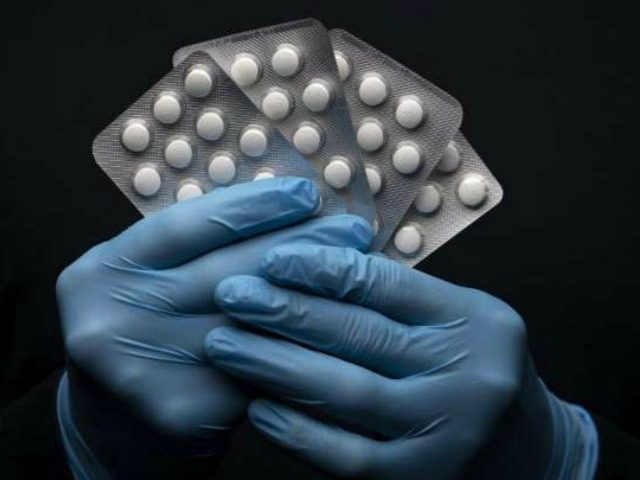There is a nearly 92 percent chance that the much-hyped anti-malaria drugs chloroquine (CQ) and hydroxychloroquine (HCQ) can help patients afflicted by the novel coronavirus, doctors told the governor of Arizona in a letter this week.
“We believe that there is clear and convincing evidence of benefit both pre-exposure and post-exposure,” doctors with the Association of American Physicians and Surgeons (AAPS) declared in the letter, referring to the use of the two drugs against coronavirus.
“Peer-reviewed studies published from January through April 20, 2020, provide clear and convincing evidence that HCQ may be beneficial in COVID-19 [coronavirus illness], especially when used early,” AAPS added in a press release issued Tuesday.
Arizona Gov. Doug Ducey (R) issued an executive order early this month banning the use of the two drugs as a preventive measure against coronavirus unless peer-reviewed evidence of their effectiveness becomes available.
Citing evidence that the drugs are significantly effective against the coronavirus when used as a preventive measure, AAPS urged Ducey to rescind his executive order.
Dr. Michael Robb, the president of AAPS’ Arizona chapter, and Dr. Jane Orient, the AAPS executive director, wrote:
As of this date, the total number of reported patients treated with HCQ, with or without azithromycin and zinc, is 2,333. Of these, 2,137 or 91.6 percent improved clinically. There were 63 deaths, all but 11 in a single retrospective report from the Veterans Administration, where the patients were severely ill.
Most of the data concerns use of HCQ for treatment, but one study included used the medication as prophylaxis [preventive measure] with excellent results. Many nations, including Turkey and India, are protecting medical workers and contacts of infected persons prophylactically. According to worldometers.info, deaths per million persons from COVID-19 as of Apr 27 are 167 in the U.S., 33 in Turkey, and 0.6 in India.
AAPS further noted in the press release:
The antiviral properties of these drugs have been studied since 2003. Particularly when combined with zinc, they hinder viral entry into cells and inhibit replication. They may also prevent overreaction by the immune system, which causes the cytokine storm responsible for much of the damage in severe cases, explains AAPS. HCQ is often very helpful in treating autoimmune diseases such as lupus and rheumatoid arthritis.
According to AAPS, the anti-malaria drugs have shown promise in decreasing the number of days a coronavirus patient is contagious, reducing the need for ventilators, and shortening the time it takes to recover.
The association acknowledged in its press release;
Unfortunately, although it is perfectly legal to prescribe drugs for new indications not on the label, the Food and Drug Administration (FDA) has recommended that CQ and HCQ should be used for COVID-19 only in hospitalized patients in the setting of a clinical study if available. Most states are making it difficult for physicians to prescribe or pharmacists to dispense these medications.
…
Vaccines and results of randomized double-blind controlled trials of new drugs are at best months away. But patients are dying now, while affordable, long-used drugs would be available except for government restrictions.
Some doctors have seen anecdotal evidence that coronavirus patients could benefit from chloroquine and hydroxychloroquine.
Evidence has also surfaced showing the drugs carry potentially severe side effects in COVID-19 patients and may not be effective in combating the disease.
A National Institutes of Health (NIH)-backed study by the U.S. Veterans Administration showed that severely ill COVID-19 patients treated with hydroxychloroquine perished at a higher rate than those who did receive the medication.
On Wednesday, however, Veterans Affairs Secretary Robert Wilkie defended the use of the drug to treat veterans plagued by the coronavirus as he faces criticism from veterans groups for administering it at VA medical centers.
The leftist mainstream media has lambasted U.S. President Donald Trump for touting the anti-malaria drugs as a possible treatment for coronavirus, accusing him of spreading “false hope.”
Media outlets went as far as blaming the president for the death of an Arizona man after he self-medicated with a fish tank cleaner that contains chloroquine.
Trump’s comments about the anti-malaria drug have echoed scientists and doctors who believe the treatment has shown promise in treating people infected by coronavirus while acknowledging that health officials need to conduct more tests on the risks associated with the medication.
The World Health Organization (WHO), the NIH, university labs, and governments across the world, including some U.S. states, are carrying out larger clinical trials of HCQ and CQ.
Democrat Andrew Cuomo, the governor of New York, the U.S. state hardest-hit by the virus, believes the anti-malaria drugs may be useful in treating coronavirus patients. He announced the start of clinical studies of the medication in New York in late March.

COMMENTS
Please let us know if you're having issues with commenting.